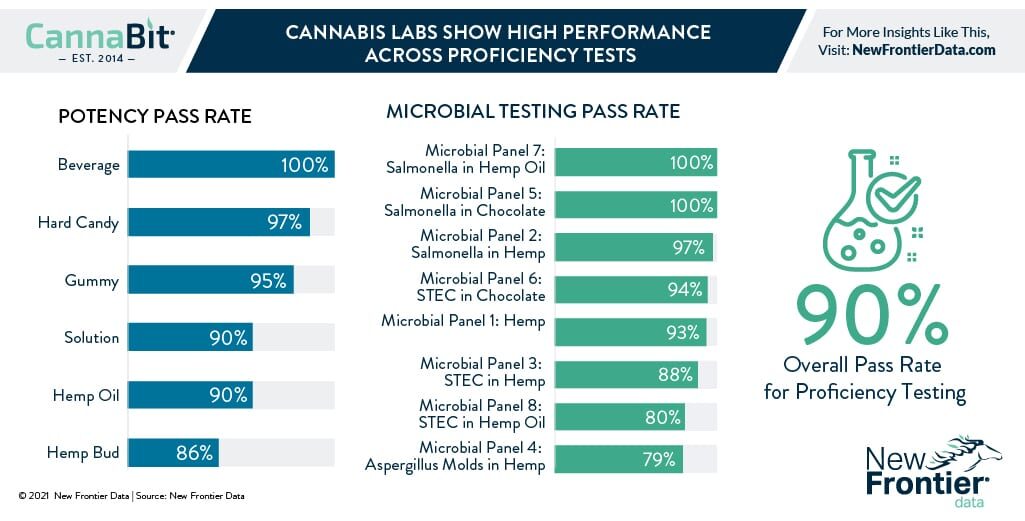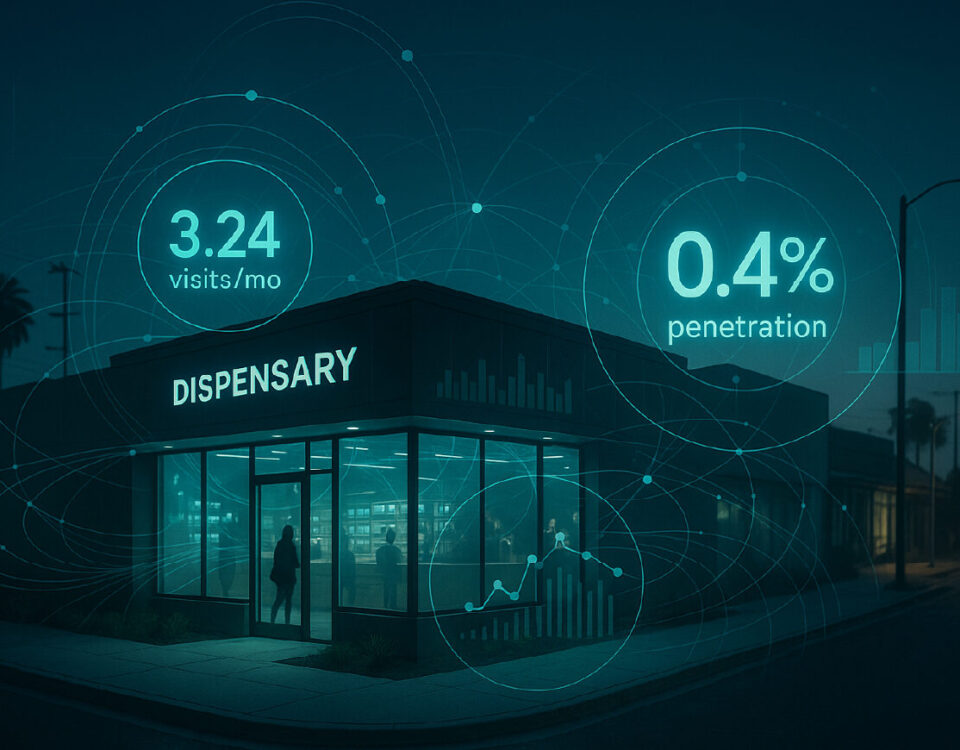Proficiency Testing Is Key to the Health of the Legal Cannabis Industry

A New Year and Gathering Momentum Offer Expanding Legal Markets
February 1, 2021
Consumer Safety and Quality Standards Emerge as a Critical Factor in Cannabis Industry Growth
February 9, 2021By J.J. McCoy, Senior Managing Editor, New Frontier Data
Cannabis testing represents a fundamental bulwark for the legal industry and the health of its economy. In the United States, approximately 250 licensed laboratories operate to fulfill state testing requirements regulating the nation’s high-THC cannabis supply. Testing for potency and contaminants is essentially important for hemp cultivators and CBD producers navigating dynamic legalities. Whereas less than 10 years ago cannabis quality-assurance safeguards were generally limited to THC potency tests using techniques appropriate only for analyzing a limited number of cannabinoids, testing labs have today ballooned in both numbers and scope to become multimillion-dollar operations for screening pesticides, heavy metals, terpenes, and a host of other analytes.
Call it a hard-earned lesson from a tragic legacy: Before the advent of the 21st Amendment and repeal of Prohibition by the U.S. Congress in 1933, doctors in the United States had become accustomed to dealing with alcohol poisoning as a routine happenstance of the era. Bootlegged whiskies and bathtub gins produced with liquor produced from hidden stills frequently came tainted with metals and other impurities which made people sick. Indeed, in measures almost unbelievable by today’s social mores (and litigation), the U.S. federal government as early as 1906 required companies to denature industrial alcohol to make it undrinkable: During Prohibition, mandates actually required adding methyl alcohol, quinine, and other toxic chemicals as intended deterrents. By 1926 in New York City, a reported 1,200 incidents of poisonous alcohol led to 400 deaths. Talk about bad for business.
Fast-forward nearly a century, and the heightened prioritization of consumer safety tests for pesticides, mold, salmonella, and E. coli — alongside traditional potency tests like THC and cannabinoid content — has forced labs to employ more sophisticated means of analysis and record-keeping. As seen among other industries’ testing facilities, cannabis labs are implementing standard operating procedures (SOPs) and best practices to pass muster with regulators and consumers. Given cannabis as an agricultural commodity with applications for both medical cannabis and the health/wellness retail sector, testing for molds, pesticides, heavy metals, terpenes, microbials, residual solvents, and other contaminants is more common for flower, but also expanding to encompass edibles and beverages, underscoring the sophistication and maturation of testing as the consumer product landscape continues to evolve.
Toward that end, New Frontier Data has partnered with Emerald Scientific to release Cannabis Proficiency Testing: The New Industry Imperative for Quality and Consumer Safety. The new study analyzes quality and safety testing across the cannabis industry, concluding that proficiency testing, the mainstay for compliance and quality assurance in the legal cannabis industry, will represent a top priority and major share of the global cannabis testing service industry as the legal market is projected to surpass $41 billion by 2025.
“As the cannabis industry continues to evolve, brands, manufacturers, consumers and regulators have come to expect, and depend on, quality and safety standards in cannabis products, just like mainstream product categories,” explains New Frontier Data Founder & CEO, Giadha A. DeCarcer. “Testing differentiates products in the legal market, giving manufacturers and retailers the opportunity to elevate their brands and credibility, particularly in terms of consumer safety.”
As already observed amid disruptions and reverberations from the COVID-19 pandemic, a premium is being placed on proficiency testing for cannabis. Demand for quality and transparency in legal markets will only increase as legalization spreads nationwide — and as legitimate products will be able to prove, differentiate, and eventually best leverage themselves to potential business partners, customers, and international markets alike on the demonstrated strength of their testing.
Beyond compliance obligations, cannabis brands and product manufacturers place such premiums on testing because their consumers increasingly and deeply care about quality metrics. In surveys, cannabis users specifically cite “testing results” and “what ingredients are in my cannabis” as top influences when making THC and CBD purchasing decisions. Assuaging consumer safety concerns with verified test results makes strategic sense for many consumer brands.
Increasingly, cannabis quality-assurance testing facilities are adopting International Organization for Standardization (ISO) testing standards (e.g., ISO 17025 accreditation) and participating in cannabis-specific proficiency testing to meet business and compliance goals. Brands and product manufacturers who choose such testing facilities stand to benefit prosperously by promoting the consumer safety advantages which lab testing will confirm about their products.




